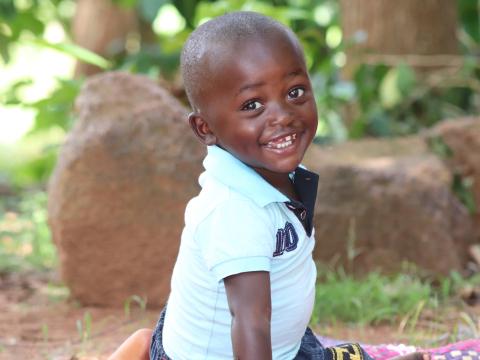Baby Daniel, born too soon but thriving

Mable was excited when she conceived. She and her husband Bob had just gotten married, and the young couple was looking forward to receiving their firstborn child. "On realising I was pregnant, we started the search for the name we would give our child," says the 24-year-old mother. "We even shopped for clothes for our baby. Life was beautiful, we were swimming in happiness."
At three months, something unusual happened. Mable started bleeding. She sought help at Masafu hospital, four kilometres from her home. A doctor told her that she had a urinary tract infection (UTI). The doctor said that UTI was a common condition in pregnancy but treatable. "The doctor told me not to worry because it wasn't a big problem. I would get well after treatment," Mable says.
She continued her antenatal visits. And at seven months, she started experiencing labour pains. Her husband rushed her to the hospital, where she gave birth to baby Daniel three months early.
Born too soon, baby Daniel did not cry or make any new-born sound. At birth, he weighed less than a kilogram and had difficulty breathing. "That wasn't a good sign at all.," says Mable. "I immediately knew there was something terrible with my baby. I was heartbroken when the doctors said my son had respiratory distress syndrome."
On the doctor's recommendation, baby Daniel was placed in an incubator to provide him with a controlled and protective environment. World Vision worked with the communities to construct the hospital's neonatal unit and provided the incubator.
After discharge, baby Daniel could not suckle. "I tried breastfeeding my son but with a lot of difficulties. He became tiny and tinier by the day, and this got me so worried," says Mable.
Daniel's parents ran out of ideas and stared at their baby, unsure of his fate.
At this point, Annet, a Village Health Team (VHT) member trained by World Vision, visited Mable and noticed something unusual about Daniel and immediately referred him to Dabani Hospital.
In Uganda, VHTs are community structures of volunteers established by the Ministry of Health to empower communities to take part in the decisions that affect their health, mobilise communities for health programmes and strengthen the delivery of health services at the household level. Usually, there are two VHT members per village.
Baby Daniel was admitted, this time at Dabani hospital, where his mother learnt about Kangaroo care, a method of holding a baby that involves skin-to-skin contact. The baby, who is typically naked, is placed upright against a parent's bare chest. Both mother and father can do Kangaroo care.
After two weeks, baby Daniel was well. Equipped with skills and knowledge in the Kangaroo method, Mable was ready to offer her baby the best care. "I didn't know anything about this [Kangaroo] method. The day I used it, baby Daniel slept all day. It was unforgettable. I had felt the terror of death at my doorstep, but now there was hope," she says.
At four months, Daniel weighed six kgs. "That was a miracle," says Mable. "I have witnessed my son's life improve, and I am stronger and more able to care for him."
Now at two years, Daniel is healthy and robust. He loves meat and milk and likes playing with his ball.
The big picture
Globally one in 10 babies are born prematurely. Babies born prematurely are vulnerable to mortality, contributing 30 per cent of neonatal deaths.
According to World Vision's Access - Infant and Maternal (AIM) Health 2021 report, four out of the 358 new-born children admitted to the neonatal units in Masafu and Dabani hospitals didn't survive. Baby Daniel was lucky and not among the four.
Orishaba Mildred, the AIM Health Project Manager, is optimistic about the project's impact. "We've involved everyone in the household. We've worked with mothers, fathers and other relatives who are part of the care system to do their part. The VHTs have been equipped and supported to do their job of mobilising, educating and mentoring new mothers, long after World Vision has gone," says Mildred.
Doreen Ntumba is a registered nurse at Dabani hospital. For two years, she has been in charge of the neonatal care unit and witnessed health-seeking behaviour changes. "You people [World Vision], you don't know what you have done for our communities," says Doreen. "You have saved lives. As a hospital, we appreciate your support. We didn't have a neonatal care unit, but now we have one where we are doing everything possible to save every life."
Since 2017, AIM Health Plus, an Irish Aid-funded project, has promoted behaviour change at the household level addressing the leading causes of maternal and neonatal mortality and improving young child survival and nutritional status in 16 sub-counties of Busia district.
To date, the project has trained 480 VHTs, reaching more than 8200 pregnant women and 42,000 children under two years.
By Sophia Aloikin, Donor Liaison, and Racheal Auma, Digital Health and M&E Field Technical Officer, World Vision Uganda